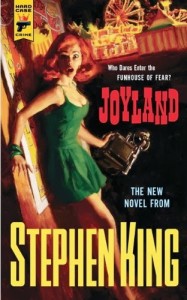A new Stephen King book hit the bookstores this week. It’s titled JOYLAND, and it’s much more like THE GIRL WHO LOVED TOM GORDON than THE STAND or MISERY or DESPERATION or the Tower series or any of a couple dozen books that I could name. It’s published under the wonderful, indispensable, and at this point venerable Hard Case Crime imprint. The book’s appearance made some major news in those places where books are still news because if you want to buy the book, you’re going to have to buy The Book. There will not be an e-book version of JOYLAND for the foreseeable future; yes, you’ll be able to obtain an audiobook, but something for your Kindle or Nook or other e-reader isn’t going to happen for awhile, unless you want to buy a copy of the book, tear out each page, paste it on Your Precious and…of course, you are not going to do that.
There is a bit of irony here, given that one of the first e-books by a mainstream writer to be published solely as an ebook — not as we know them now, but it was an ebook nonetheless — was a novella entitled “Riding the Bullet,” a chilling little ten-finger exercise that was written by, uh, Stephen King. You had to download some (free) software called “SoftLock” in order to read it. This occurred way back in 2000. There were other ebooks published, including a pay-as-you-go serial by King titled “The Plant,” but the format never really caught on until some smart folks at Amazon came up with what they came up with. King, however, was there at the beginning. There accordingly have been some who have now taken King to task over what they perceive to be his apparent one-eighty, somehow finding him to blame for the popularity of the electronic format since he was one of the first to embrace it with the same fervor that Jack Torrance embraced that rotting corpse in THE SHINING. I would disagree. King has made quite clear that his reason for limiting the format of JOYLAND to physical form isn’t to disown the child he midwifed at the turn of the century; he is doing it to help physical booksellers. This is not something new for King; those of us of some age will recall that King did an unapologetic tour of indy stores in 1994 to promote INSOMNIA, riding his motorcycle from city to city and making appearances to yes, mobs of people. There’s also a more recent model for this. A growing number of musicians are occasionally releasing some new songs only on vinyl, to support independent record stores. Is he taking a risk financially, by limiting the format to physical books, and cutting out the impulse buyer? Possibly. Is Hard Case Crime? Almost certainly. JOYLAND won’t be available at the press of a button; it’s going to take some effort, and yes, some waiting to get it, maybe even some inconvenience. Some folks may feel it’s not worth the hassle.
But can I tell you something, as someone who loves his Kindle? JOYLAND is worth whatever it takes for you to get it. Let me go further than that: this is a book that should only see the light of day as an actual book. It’s a coming of age novel, with some mystery and romance and a bit of the supernatural thrown in, and it works as a physical book. JOYLAND is set in 1973, at a downheel amusement park on the coast of North Carolina, and I swear that as I turned the pages I could smell — very faintly — popcorn and taffy and ocean water and hear ferris wheel music rising up from between the pages. Am I given to imagining things? Maybe. But isn’t that what reading is all about? I don’t think it would be quite the same on an e-reader.
Let me now ask you: what was the last physical book (and we’ll count audio books in the mix) that you purchased? How long ago was it? And what do you think of what King and Hard Case Crime are doing with JOYLAND? Do you think that limiting its format to a physical product is a good idea or a huge mistake?

